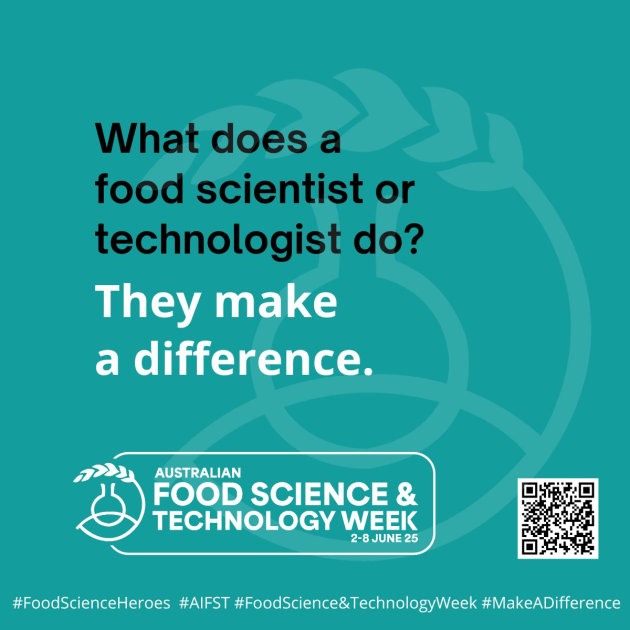With more than a third of Australians never having heard about jobs titled food scientist or food technologist, it is more important than ever to promote the vital work these jobs play. Australian Institute of Food Science and Technology CEO, Fiona Fleming, offers insight.
In 2024, research commissioned by the Australian Institute of Food Science and Technology (AIFST) found Australians’ lacked knowledge about the sector, despite the vital role food scientists and technologists play in shaping what we eat and ensuring our food is safe, nutritious, innovative, and increasingly sustainable.
To help close this awareness gap and celebrate our food science & technology heroes, AIFST launched its inaugural Australian Food Science & Technology Week (2-8 June). As the peak body representing food science and technology, AIFST used the campaign to highlight the people, disciplines, and science behind every bite.
The breadth of roles within food science and technology is remarkable, and increasing awareness and recognition of their contributions to real-world challenges – such as food security and food safety – is a vital investment in our future.

Many disciplines
Food science and technology is a broad, multidisciplinary field encompassing biology, chemistry, engineering, health science, and consumer behaviour to name a few. These disciplines span the entire agrifood system, from paddock to plate, in both public and private sectors.
Some of the key disciplines include:
- Quality Assurance (QA) – Maintaining food safety and quality systems that ensure safety, traceability, and consumer confidence across the supply chain;
- Sensory & Consumer Science – Understanding how people perceive food through their senses to inform product development and reformulation;
- Food Microbiology – Ensuring food safety and shelf life by identifying and managing microbial risks while also harnessing beneficial microbes for fermentation, flavour development, and gut health;
- Food Engineering – Designing efficient, scalable systems for processing, packaging, and distributing food sustainably;
- Food Chemistry – Studying molecular structures and interactions of ingredients to enhance nutrition, taste, and stability;
- Human Nutrition – Informing formulation and health policy through evidence-based dietary guidance and communication; and
- Food Regulation & Policy – Ensuring compliance, safety, and clarity including food labelling and novel food approvals.
These roles don’t operate in isolation. Collaboration between disciplines is essential to solving the complex challenges of our modern agrifood system.
Solving real-world challenges
Food scientists and technologists are not just working in labs – they’re driving innovation on some of the biggest global issues.
Sustainability
Food engineers and chemists are developing recyclable and biodegradable packaging and improving energy efficiency in manufacturing. Microbiologists help reduce food waste through shelf-life extension.
Nutritionists support shifts toward sustainable dietary patterns, such as plant-forward diets that reduce environmental footprints.
Food security
Food scientists and technologists play a vital role in protecting food supply chains and developing nutrient-dense and affordable alternatives. For instance, innovations in alternative proteins and fortified staple foods are helping address global nutrition needs. Regulatory and QA experts also ensure consistent supply chain integrity, critical in the face of climate disruption and trade pressures.
Consumer health
Food reformulation is a key strategy to combat diet-related diseases. Reductions in salt, sugar, and saturated fat are led by food scientists and guided by sensory scientists to maintain consumer acceptance. Clear front-of-pack labelling and health claims – supported by regulatory frameworks – enable more informed food choices.
Across these areas, food scientists and technologists are contributing through research, education, industry innovation, and public health policy – making an impact from the ground up.
Engage 2025
To raise awareness of food science and technology as a career, AIFST is increasing visibility through targeted education and workforce initiatives. Its new Engage 2025 Program strengthens links between tertiary education providers and industry, helping students develop work-ready skills and connections. Meanwhile, the AIFST Mentoring Program, now in its ninth year, pairs graduates and early-career professionals with experienced mentors across Australia’s agrifood sector.
With growing demand for system-wide thinking, scientific integrity, and cross-disciplinary collaboration, it is vital that the agrifood sector attracts and supports diverse new talent – particularly in the face of climate change and global health challenges.
Looking ahead
As Australia works to build a more sustainable and resilient food future, the role of food scientists and technologists has never been more important – and the industry is rising to meet that need. Awareness is growing, collaboration is strengthening, and a new generation is discovering the impact and opportunity offered by food and technology science careers.
Food science and technology is not just about what’s on your plate. It’s about the science underpinning how food is made, and critical aspects of safety, nutrition and impacts on both people and the planet.
AIFST is proud to champion the people and the science behind every bite – and to support the many faces of the food scientist and technologist – our heroes!
To find out more about AIFST’s programs, Food Science & Technology Week, or careers in the sector, visit www.aifst.asn.au.
This article first appeared in the June/July 2025 edition of Food & Drink Business magazine.






